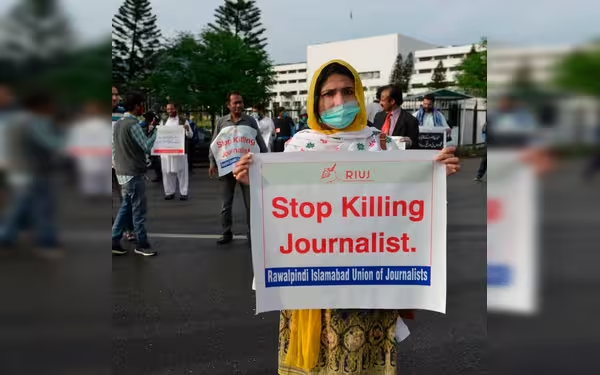Thursday, July 4, 2024 05:52 PM
Journalists in Pakistan face threats to press freedom
- Pakistan is one of the most dangerous countries for journalists
- Journalists in Pakistan face censorship and self-censorship
- Digital transformation poses challenges for journalism in Pakistan
 Image Credits: Foreign Policy
Image Credits: Foreign PolicyExplore the challenges faced by journalists in Pakistan, including threats to press freedom, safety concerns, censorship, economic pressures, political interference, and the impact of digital transformation.
Journalism in Pakistan is a profession marked by numerous challenges, including threats to press freedom, safety concerns, censorship, economic pressures, political interference, and the impact of digital transformation. Journalists in the country operate in a complex environment shaped by political, social, and cultural factors.
Threats to Press Freedom
Pakistan is considered one of the most dangerous countries for journalists, with media professionals often facing harassment, intimidation, and violence. Those critical of the government, military, or powerful interest groups risk retaliation, including physical attacks and even murder, leading to a climate of fear that hampers investigative reporting.
Safety and Security Concerns
Journalists covering sensitive topics like terrorism and human rights abuses face threats from various groups, including militants, political factions, and security forces. Despite the risks, many journalists continue to work in hazardous conditions to report on issues of public interest, with some even forced into exile for their safety.
Censorship and Self-Censorship
Censorship, both overt and covert, is a significant issue in Pakistan, with government agencies, military authorities, and influential individuals exerting control over media outlets. This leads to self-censorship among journalists to avoid repercussions, creating a culture of silence that undermines press freedom.
Economic Pressures
The economic sustainability of journalism in Pakistan is under strain, with media organizations facing declining revenue and rising costs. Layoffs, salary cuts, and job insecurity are common, limiting journalists' ability to conduct in-depth reporting, especially for freelancers and independent journalists.
Political Interference
Pakistan's media landscape is heavily politicized, with media outlets often aligned with specific parties or interest groups. Politicians influence coverage through ownership structures and regulatory bodies, leading to ostracism and legal action against journalists who do not conform, compromising journalistic integrity.
Digital Transformation
The rise of digital media has transformed journalism in Pakistan, offering new platforms for information dissemination. However, online journalists face cyber harassment and censorship, with government regulations further restricting freedom of expression in the digital sphere.
Conclusion
Despite the challenges faced by journalists in Pakistan, many remain dedicated to upholding journalistic principles and promoting transparency. The struggles for press freedom, safety, economic stability, and independence from political influence underscore the vital role of a free and independent press in safeguarding democracy and ensuring accountability.













